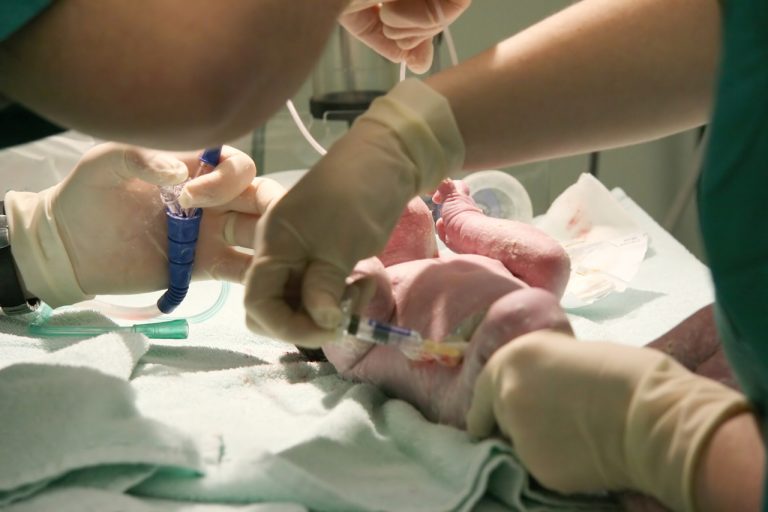Opinion | Since 1961, the American Academy of Pediatrics (AAP) has recommended that all newborns receive a vitamin K1 injection to prevent uncontrolled bleeding caused by vitamin K deficiency.1 2
Vitamin K1 is required for proper blood clotting, and newborns tend to have low levels due to the fact that vitamin K doesn’t cross the placenta very well. Deficiency can result in sudden internal bleeding—typically in the brain or intestines. This is referred to as “vitamin K deficiency bleeding” or VKDB, and can be life-threatening.
Research published in 20143 4 in the journal Pediatrics found the number of parents declining the vitamin K shot for their newborn babies was on the rise, increasing from 0.21 percent in 2006 to 0.39 percent in 2012.5
The data were based on infants born in Alberta, Canada. In the U.S., data6 presented at the 2014 CSTE conference reported the refusal rate at two Nashville, Tennessee, hospitals ranged from 2.3 percent to 3.7 percent in 2013.
A second 2014 study7 also concluded vitamin K refusal was on the rise, and with it, an increase in late onset vitamin K deficiency bleeding in infants. Of seven infants with confirmed vitamin K deficiency, five developed vitamin K deficiency bleeding.
A 2017 poll8 found the most common reasons given by parents for refusing the vitamin K shot were “perceptions of parents that the injection was unnecessary, lack of knowledge about vitamin K deficiency bleeding, and concern about preservatives.”
Vitamin K Refusal Linked to Vaccine Avoidance
As reported by Scientific American,9 the 2014 Pediatrics paper10 found that children who did not receive the vitamin K shot at birth were also 14.6 times more likely to be unvaccinated at the age of 15 months. According to the authors:11
This is the first population-based study to characterize parents who are likely to decline vitamin K for their infants and whose children are likely to be unimmunized. These findings enable earlier identification of high-risk parents and provide an opportunity to enact strategies to increase uptake of vitamin K and childhood immunizations.
Senior author Shannon MacDonald told Scientific American:12
Our finding of a link between vitamin K refusal and vaccine refusal was very concerning. We had expected a correlation between the two but had not expected the association to be so high.
The correlation between vitamin K shot refusal and vaccine avoidance is turning out to have severe ramifications for many parents. In short, by saying no to the vitamin K shot, some hospitals are automatically labeling you a negligent parent and a dreaded anti-vaxxer in the making, so to speak.
Babies Taken From Parents Who Refused Vitamin K Shot
A number of stories have emerged detailing how parents have had their newborn babies taken from them by simply because they declined the vitamin K injection. In a September 2019 article,13 The Daily Citizen describes the harrowing ordeal of Angela and Brian Bougher:
The Christian couple believes that ‘God’s creation isn’t automatically deficient or flawed at birth’ and the shot is unnecessary. The Boughers have a right to their beliefs, and if they were fully informed of the risks then they should be able to decline. The state of Illinois didn’t see it that way.
Instead, in the moments after birth, a nurse told the Boughers that their newborn daughter was being taken away and they were being investigated for ‘medical neglect.’ It took 12 hours to get their daughter back.
It’s debatable whether the logic of Boughers’ decision is sound—however, medical professionals should know that the first moments of life are crucial to both mother and child. To remove a child for such a reason is a severe overreach of the state’s responsibility to protect children from neglectful parents.
The family’s pain did not stop there. Later the Illinois Department of Children and Family Services (DCFS) had law enforcement officers make an unannounced visit the Boughers’ home to investigate and determine if any of their other four children were being ‘neglected.’
The Boughers and several other Illinois families who experienced harassment and investigation by the DCFS over refusal of the vitamin K shot have filed a class action lawsuit against local hospitals (Silver Cross Hospital, Advocate Christ Medical Center and the University of Chicago Medical Center), the AAP, the DCFS and several pediatricians. As reported by CBS Sept. 24, 2019:14
They want a compensation and a court-enforced guarantee that the Illinois Department of Children and Family Services won’t be called if parents refuse to give their babies a Vitamin K shot.
In 2010, I interviewed Cees Vermeer, PhD, an associate professor of biochemistry at the University of Maastricht in the Netherlands,15 and one of the world’s leading specialist in vitamin K.16 I’ve included it above for your convenience.
According to Vermeer, while vitamin K1 is necessary for newborns, the shot is not. There are far safer and noninvasive ways to normalize your baby’s vitamin K1 level. He points out several areas of risk associated with the vitamin K injection:
- The amount of vitamin K injected into newborns (0.5 to 1 milligram17) is far greater than needed.
- The injection may contain benzyl alcohol,18 a preservative that may be toxic for the baby’s delicate immune system.Preservative-free shots may contain a combination of polysorbate 8019 and propylene glycol20 instead,21 but these ingredients also have a questionable safety profile. For polysorbate 80, hypersensitivity and possible death are among the known risks.22
- An injection creates an additional opportunity for infection in an environment that contains some of the most dangerous germs, at a time when your baby’s immune system is still immature.
Perhaps most importantly, though, inflicting pain immediately after birth causes psycho-emotional damage and trauma to a newborn, which is both inappropriate and unnecessary.
In his 1999 paper, “Babies Don’t Feel Pain: A Century of Denial in Medicine,” David B. Chamberlain, PhD, a psychologist and co-founder of the Association of Pre-and Perinatal Psychology and Health, wrote:23
The earlier an infant is subjected to pain, the greater the potential for harm … We must alert the medical community to the psychological hazards of early pain and call for the removal of all man-made pain surrounding birth.
A 2004 study24 found that very early pain or stress experiences have long-lasting adverse consequences for newborns, including changes in the central nervous system and changes in responsiveness of the neuroendocrine and immune systems at maturity. Similarly, a 2008 study25 concluded:
Healthy newborns routinely experience acute pain during blood sampling for metabolic screening, injection of vitamin K or hepatitis vaccine, or circumcision.
Acute pain caused by skin-breaking procedures can lead to physiologic instability and behavioral distress, and it has downstream effects on subsequent pain processing, development and stress responsivity. Because of these detrimental effects, reduction and prevention of pain are worthy clinical goals that are also expected by most parents.
Oral Vitamin K Is a Safe and Effective Alternative
The good news is there’s a completely noninvasive and pain free way to ensure your baby gets the vitamin K1 it needs: oral vitamin K drops, which are readily available for hospitals to purchase26 if they do not routinely stock it.
Oral vitamin K1 is absorbed less efficiently than vitamin K1 that is injected. However, this can easily be compensated for by adjusting the dose. And, since vitamin K1 itself is nontoxic, there is no danger of a bad reaction.
One reason oral vitamin K is not routinely used is because it requires multiple doses, and it’s feared new parents will forget to comply with the dosing. There are many variations in recommendations for the oral dosing. Among them:
|
|
|
|
|
|
As noted by Vermeer, you can also increase your infant’s vitamin K level naturally if you are breastfeeding by increasing your own vitamin K level. The milk of lactating women has been tested, and most is low in vitamin K because the women themselves are vitamin K deficient.
If you take a vitamin K1 supplement, your milk also becomes richer in vitamin K, as you would expect. However, prudence is required—you need to make sure your vitamin K level is truly optimized, and for most women, the vitamin K absorbed from foods won’t be enough, so supplementation might be needed.
This article was reprinted with the author’s permission. It was originally published on Dr. Mercola’s website at www.mercola.com.
Note: This commentary provides referenced information and perspective on a topic related to vaccine science, policy, law or ethics being discussed in public forums and by U.S. lawmakers. The websites of the U.S. Department of Health and Human Services (DHHS) provide information and perspective of federal agencies responsible for vaccine research, development, regulation and policymaking.
References:
1 CDC.gov, FAQ Vitamin K Deficiency Bleeding.
2 Evidence Based Birth, The Vitamin K Shot in Newborns.
3 Pediatrics September 2014; 134(3)
4 Scientific American August 19, 2014.
5 Ibid.
6 2014 CSTE Conference, Vitamin K Refusal Rates.
7 Pediatric Neurology 2014 Jun;50(6):564-8.
8 Acad Pediatr. 2017 May-Jun; 17(4): 368–373.
9 See Footnote 4.
10 See Footnote 3.
11 Ibid.
12 See Footnote 4.
13 The Daily Citizen September 27, 2019.
14 CBS September 24, 2019.
15 Cees Vermeer Maastricht University.
16 Neutraceuticals World, June 11, 2013.
17 Healthychildren.org, Vitamin K.
18 AquaMephyton Ingredient List (PDF).
19 Toxnet, Polysorbate 80.
20 Toxnet, Propylene Glycol
21 Phytonadione Ingredient List (PDF).
22 See Footnote 19.
23 Journal of Prenatal & Perinatal Psychology & Health, Babies Don’t Feel Pain: A Century of Denial in Medicine.
24 The Journal of Perinatal Education 2004 Summer; 13(3): 10–17.
25 CMAJ 2008 Jul 1; 179(1): 11–12.
26 Edgepharma.com Vitamin K Oral Solution for Hospitals.
27 Evidence Based Birth Oral Vitamin K Regimen.
28 Acta Paediatric 2003 Jul; 92(7): 802-5.
29 Annals of Pharmacotherapy June 1, 2012 DOI: 10.1345/aph.1Q769.
30 See Footnote 27.
31 European Journal of Pediatrics 2013; 172: 357-360 (PDF).
32 See Footnote 29.













13 Responses
I appreciated reading this article, thank you.
The midwives who attended my two home births in 1987 and 1990 suggested I begin eating a cup of sprouts, which are high in Vitamin K, per day during the last month or so of my pregnancies to help support/build up my and the infants’ stores of Vitamin K; I gave birth to two healthy babies.
Had [a dreaded] transfer to the hospital for complications during childbirth occurred, our family’s plan was to decline Vitamin K shots there – gratefully that transfer wasn’t necessary.
I’m curious/surprised, what’s the reason that this natural food source of Vitamin K is omitted in this article…?
As usual, the vaccine makers are making a big deal over something measly. A human being, by the age of nine days produces Vitamin K on it’s own. That’s why circumcisions were postponed in the Jewish community ( clear back to ancient times) until day 9, because by day nine vitamin K is produced by the body itself. Parents, please keep a close eye on YOUR children and don’t allow hospitals or other medical personnel to force ANYTHING on your children or babies that you don’t want.
Exactly!
Why does the personnel at the hospital believe THEY have the right to the child that is superior to parental rights????
Exactly!
“Parents, please keep a close eye on YOUR children and don’t allow hospitals or other medical personnel to force ANYTHING on your children or babies that you don’t want.”
Yes to the above in spades! To make a long story short, when my son was born with an irregular breathing pattern, I was assured by not one but 7 doctors that I was over-reacting! One after another, in the hospital in which my pediatrician was affiliated, (interestingly no longer exists) taking me aside to speak to me in confidence and insisting that my beautiful baby was fine.
Luckily, my pediatrician was listening to my concerns and contacted Dr. C Everett Koop, then head of respiratory in Children’s Hospital, Philadelphia. He immediately realized the condition (Phrenic Nerve Palsy) and performed a very successful operation which repaired his diaphragm. He congratulated me for my perseverance, and said that overlooking the symptom would have shortened his life considerably.
Omg, I froze reading this. I would have had a wonderful older brother but he died from overlook negligence because of this very same problem. A hole in his diaphragm. A simple operational stitch. My poor Mother. RIP Mitchell 7-7-70
Participate in the consumption of our products by way of insurance subsidy, or else…
I only wish I have known all that those 20+ years ago when I gave birth to my son!
Unfortunately I did not. I trusted doctors, and he now has two permanent disabilities.
I am only thankful that we did not see a pediatrician in his first year of life – he would not have survived the vaccine assault…
In the age of information ignorance is a choice.
Wow wow wow… Some choice bits of utter trollip quoted by medical professionals. No wonder the whole world is losing faith in these yahoos! I had 4 children with no interventions or shots and drops of any kind. They grew up strong and helathy for the most part and didn’t even have brain bleedingswhen faling off horses and bikes and skateboards and trees.
Does the introduction of vit. K for newborns have anything to do with corporations wanting to keep the baby’s cord blood for themselves?
Insane!! Hysterical needle profit alert!!! THE RDA FOR INFANTS VIT K IS 2.5 MCG!!!! MICROGRAMS!! I wold think that easily passes to the placenta? My vitie book notes also that infants lack a intestinal bacteria that facilitates the use of K…..Another good article by Vaccine Reaction. Thank you.
I just googled vitamin K formula and that is another option for women who cannot breastfeed and don’t want to do the injection. Something I will consider if I have more kids.